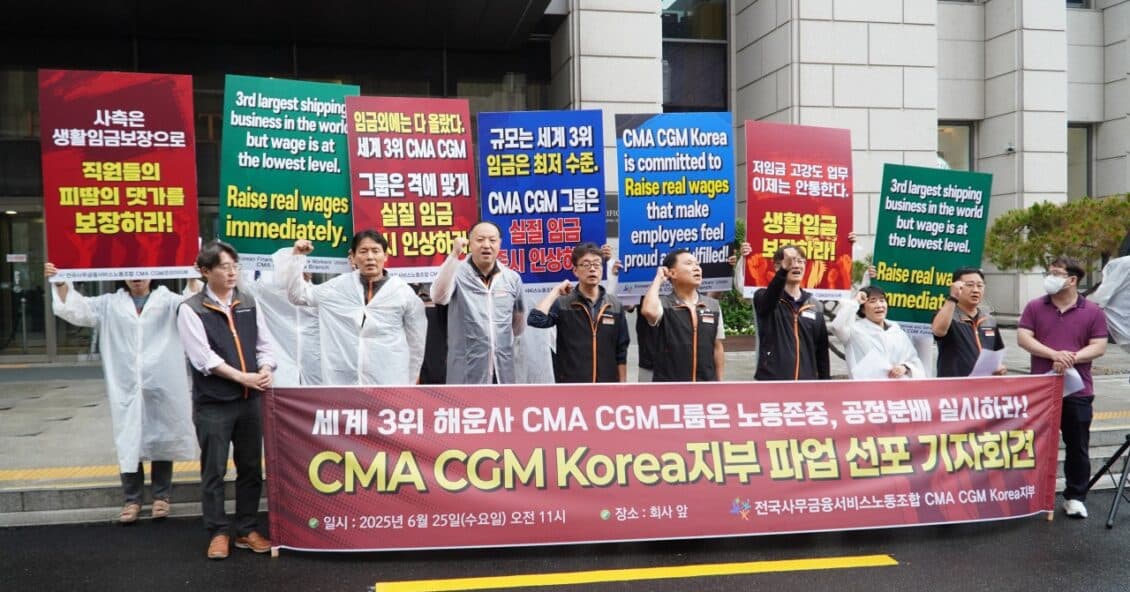Korean union challenges wage injustice and union suppression at CMA-CGM
09.07.25
A young union is raising its voice against CMA-CGM, a top globally ranked shipping company, for its subpar treatment of workers in its Korean operations.
The CMA-CGM Korea Union represents all professional and clerical white-collar workers at CMA-CGM Korea, a segment of the workforce covered under UNI Global Union’s intersectoral work on professionals and managers.
Wage gap
At a press conference held on 25 June, the CMA-CGM Korea Union protested the French shipping giant for what it described as the Korean branch’s insincere conduct during recent rounds of wage negotiations. The union charged the company with failing to live up to its global stature by underpaying its Korean workforce.
The union is demanding that CMA-CGM Korea raise wages and guarantee fair compensation in line with industry peers. Currently, CMA-CGM Korea workers earn on average 35 per cent less than their counterparts at HMM, a Korean shipping company ranked 7th globally. CMA-CGM, headquartered in Marseille, France, is ranked 3rd globally and in 2024 reported a net profit of US$5.7 billion on revenues of US$55.5 billion.
“Despite CMA-CGM’s global success, Korean employees are paid significantly less than their peers — even with similar skills and experience,” said Yoon Jae-Woong, President of the CMA-CGM Korea Union. “The lack of fair wages and absence of proper dialogue channels have pushed many skilled workers to leave. We urge CMA-CGM to recognize this reality and take genuine steps to improve conditions.”
Union under pressure
Beyond the wage disparity, the union also raised serious concerns about attempts to undermine union activity.
Established in 2022 with the support of UNI affiliate Korea Federation of Service Workers’ Unions (KFSWU), the CMA-CGM Korea Union is the first enterprise-level union formed in a foreign-owned shipping company in Korea. It is the second enterprise union in the shipping industry in the country, after HMM. Its formation marked a milestone in expanding union representation within the sector.
However, the company has not established any effective grievance-handling or dialogue mechanism with the union since then. The union president had taken on the role of collecting and forwarding employee grievances directly to the relevant managers. Instead of responding constructively, management reportedly engaged major law firm Kim & Chang to investigate whether conversations between department heads and the union president constituted workplace harassment.
In response, union members have begun daily lunchtime picketing and have pledged to escalate their actions if negotiations do not progress meaningfully.
Rajendra Acharya, Regional Secretary of UNI Asia & Pacific, said: “CMA-CGM’s public commitments to workers’ rights and ethical business must be reflected in its actions in every country. It is unacceptable for a global company of this scale to undercut industry standards while silencing workers’ voices. We stand with the CMA-CGM Korea Union in their pursuit of dignity and genuine dialogue.”
UNI Asia & Pacific extends its full solidarity with the CMA-CGM Korea Union in their struggle for fair compensation and the right to freedom of association.
Background
CMA-CGM is subject to France’s Duty of Vigilance Law, which requires large companies to identify and prevent risks to human rights, health and safety, and the environment across their global operations and supply chains.
CMA-CGM’s 2024 Vigilance Plan states that the company “respects the right of its employees to form and join trade unions in all its business areas… and is supportive of social dialogue in all of its employee management bodies in accordance with applicable local rules.”
Its Third-Party Code of Conduct similarly requires all partners to respect internationally recognized human rights and labour standards. CMA-CGM’s Code of Ethics affirms the company’s commitment to ensuring adequate wages and benefits and to recognizing workers’ rights to form or join trade unions.
Updated post-publication to include additional attributed quotes.


